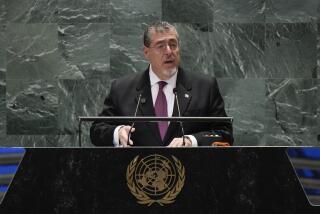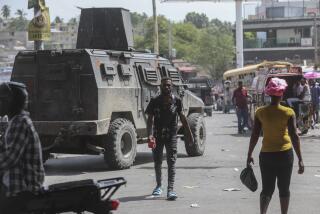U.S. Seeks to Boost World Police Pool
- Share via
WASHINGTON — Alarmed by a breakdown of law and order in postwar Kosovo, the Clinton administration launched a program Thursday that would create a pool of police officers ready on short notice to come to the aid of U.N. peacekeepers around the world.
Secretary of State Madeleine Albright, who announced the initiative, said it is intended to bolster U.N. programs, supplying temporary international police forces for countries where normal law enforcement doesn’t exist.
Although U.N. police forces aren’t new, the operations have often failed because U.N. member countries provided too few officers with too little specialized training, U.S. officials said.
Albright said the U.S. effort would also offer training to foreign police officers, who would also be available for U.N. programs.
“The recent slowness in deploying desperately needed civilian police to Kosovo provides only the latest evidence that present international capabilities are not adequate,” Albright said. “And the ongoing deployment of [police] teams to East Timor and Sierra Leone show that the need will not soon diminish.”
Administration officials stressed that the U.S. initiative is intended to help the world meet Kosovo-type emergencies in the future. They cautioned that the effort would not provide an instant fix for the problems in the separatist Serbian province, where violence has flared in recent weeks.
The U.N. authorized more than 3,100 international police officers, drawn from nations around the world, to handle civilian police operations in Kosovo until local police can be trained. But only about 2,300--including 700 Americans--have been sent. As a result, military peacekeepers have been forced to take on tasks that are better performed by police in Kosovo.
U.N. police forces usually accompany military peacekeepers to war-torn regions to restore law and order, handling tasks such as crime investigations that are better done by civilians than by military units. The U.N. police remain until local law enforcement officers can be recruited and trained.
In ethnic conflicts such as the ones in Kosovo and East Timor, which until recently was occupied by Indonesian forces, local police often represent just one side in the conflict. The prewar police forces in Kosovo were dominated by Serbs.
Administration officials said the new U.S. program is intended to make the U.N. system work better, not replace it. In addition to training U.S. and foreign police officers for U.N. operations, the initiative is designed to help train impartial local police officers, judges and lawyers who can take over when the international force withdraws.
Albright said the administration is asking Congress for $10 million to pay for the new program.
Rand Beers, assistant secretary of State for international law enforcement, said the administration envisions a cadre of 2,000 U.S. police officers ready to serve a one-year assignment. If called upon, volunteers would have to obtain a leave of absence from their normal jobs. Police who retired within the last three years would be eligible if they are physically fit.
Beers said that if the number of U.N. deployments increases, the pool could be enlarged.
But Beers emphasized that the administration doesn’t plan to increase the number of U.S. police officers now in Kosovo. He said it is up to other U.N. members to supply the needed additional personnel. The purpose of the new pool would be to provide replacements for officers reaching the end of their assignments and to be prepared for other peacekeeping operations that may arise.
In addition to the chronic shortage of international police officers in Kosovo, the peacekeeping force there is also stretched thin. On Wednesday, France offered to send 600 to 700 additional troops, about one-third of the 1,800 additional forces commanders have said the NATO-led force needs. The Pentagon said it would consider dispatching an undetermined number of Marines.
But Albright said Thursday that the United States, which has had the largest military contingent in Kosovo, should not be asked to send more. “We are definitely doing our part,” she said.
More to Read
Sign up for Essential California
The most important California stories and recommendations in your inbox every morning.
You may occasionally receive promotional content from the Los Angeles Times.













